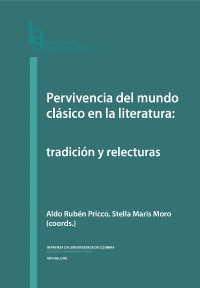Please use this identifier to cite or link to this item:
https://hdl.handle.net/10316.2/90294| DC Field | Value | Language |
|---|---|---|
| dc.contributor.author | Brncić, Carolina | |
| dc.date.accessioned | 2017-09-29T09:51:16Z | |
| dc.date.accessioned | 2020-09-06T00:07:43Z | - |
| dc.date.available | 2017-09-29T09:51:16Z | |
| dc.date.available | 2020-09-06T00:07:43Z | - |
| dc.date.issued | 2017 | - |
| dc.identifier.isbn | 978‑989‑26‑1438‑0 | |
| dc.identifier.isbn | 978‑989‑26‑1439‑7 (PDF) | |
| dc.identifier.issn | ISSN:2182‑8814 | |
| dc.identifier.uri | https://hdl.handle.net/10316.2/90294 | - |
| dc.description.abstract | This paper focuses on the discussion about tragedy’s permanency in French dramaturgy of the thirties and forties, a trend which can be appreciated in the stances of Andre Gide, Jean Anouilh, Albert Camus and Jean Paul Sartre. In order to explore this subject, it addresses and contrasts the ideas about theatre and tragedy developed by the authors in their essays and conferences, focusing on two main aspects, which in their opinion define the tragic genre and style as well as their conception of a “new theatre”: the use of language and the effect of defamiliarization. In connection with this dramatic estrangement, the article also deals briefly with the discussion about the tragic genre which takes place at the meta-dramatic twists of Gide’s Oedipus and Anouilh’s Antigone. | eng |
| dc.description.abstract | El siguiente trabajo se centra en la discusión sobre la pervivencia de la tragedia en la dramaturgia francesa de las décadas de los treinta y los cuarenta en las posiciones de André Gide, Jean Anouilh, Albert Camus y Jean Paul Sartre. Para ello se aborda y confronta la reflexión sobre el teatro y la tragedia formulada en sus ensayos y conferencias, focalizando en dos aspectos centrales que para estos dramaturgos define tanto al género y al estilo como a su propia noción de un nuevo teatro: el uso del lenguaje y el efecto de desfamiliarización. Por otra parte, y en directa vinculación con este extrañamiento dramático, se aborda sucintamente la discusión sobre el género trágico en los giros metadramáticos de Edipo de Gide y Antígona de Anouilh. | por |
| dc.language.iso | spa | - |
| dc.publisher | Imprensa da Universidade de Coimbra | por |
| dc.relation.ispartof | http://hdl.handle.net/10316.2/42874 | por |
| dc.rights | open access | - |
| dc.subject | Tragedy | eng |
| dc.subject | French drama | eng |
| dc.subject | estrangement | eng |
| dc.subject | reflexivity | eng |
| dc.subject | Tragedia | por |
| dc.subject | drama francés | por |
| dc.subject | extrañamiento | por |
| dc.subject | reflexividad | por |
| dc.title | Teoría y praxis: la pervivencia de la tragedia en el teatro francés | por |
| dc.title.alternative | Theory and praxis: the reception of tragedy in French theatre | eng |
| dc.type | bookPart | por |
| uc.publication.firstPage | 151 | - |
| uc.publication.lastPage | 160 | - |
| uc.publication.location | Coimbra | por |
| dc.identifier.doi | 10.14195/978-989-26-1439-7_13 | - |
| uc.publication.digCollection | PB | por |
| uc.publication.orderno | 12 | - |
| uc.publication.area | Artes e Humanidades | por |
| uc.publication.bookTitle | Pervivencia del mundo clásico en la literatura: tradición y relecturas | - |
| uc.publication.manifest | https://dl.uc.pt/json/iiif/10316.2/90294/202790/manifest?manifest=/json/iiif/10316.2/90294/202790/manifest | - |
| uc.publication.thumbnail | https://dl.uc.pt/retrieve/11044394 | - |
| uc.publication.parentItemId | 56842 | - |
| uc.itemId | 68563 | - |
| item.grantfulltext | open | - |
| item.fulltext | With Fulltext | - |
| Appears in Collections: | Pervivencia del mundo clásico en la literatura: tradición y relecturas | |
Files in This Item:
| File | Description | Size | Format | |
|---|---|---|---|---|
| teoria_y_praxis_la_pervivencia_de_la_tragedia_en_el_teatro_frances.pdf | 563 kB | Adobe PDF |  |
Items in DSpace are protected by copyright, with all rights reserved, unless otherwise indicated.
